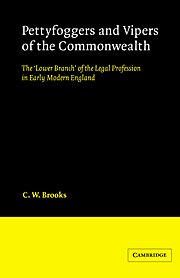 Pettyfoggers and Vipers of the Commonwealth
Pettyfoggers and Vipers of the Commonwealth Published online by Cambridge University Press: 28 October 2009
By 1600, the enormous increase in litigation which had taken place since the 1550s began to produce concern amongst observers, both inside and outside the legal profession, that there were too many lawsuits. In the space of a mere half-century England seemed to have become an extremely litigious country.
Exactly how litigious early modern society was can be gauged only by making comparisons with other periods. We know already that for two hundred years before 1550 litigation in the central courts was much lower than it was to become by 1550. Going even further back into the past, during the twelfth and thirteenth centuries, much legal work may have been done in local courts, but simple comparisons of the bulk of the plea rolls leave little doubt that central court business was nowhere near the level it was to reach under Elizabeth. For the period after 1640 and on into the eighteenth century, there is as yet no statistical evidence of sufficient quality on which to build a confident picture of trends in litigation. Cockburn's counts of cases heard by justices of assize remain high until the late 1660s and early 1670s, when a quite precipitous fall-off begins, which lasted well into the eighteenth century. But, since cases at assize were by definition cases nearing completion, such figures may not be a reliable guide to the number of causes commenced. Statements made by court officials to parliamentary inquiries give the quite contrary impression that litigation was still buoyant in the 1720s.
To save this book to your Kindle, first ensure [email protected] is added to your Approved Personal Document E-mail List under your Personal Document Settings on the Manage Your Content and Devices page of your Amazon account. Then enter the ‘name’ part of your Kindle email address below. Find out more about saving to your Kindle.
Note you can select to save to either the @free.kindle.com or @kindle.com variations. ‘@free.kindle.com’ emails are free but can only be saved to your device when it is connected to wi-fi. ‘@kindle.com’ emails can be delivered even when you are not connected to wi-fi, but note that service fees apply.
Find out more about the Kindle Personal Document Service.
To save content items to your account, please confirm that you agree to abide by our usage policies. If this is the first time you use this feature, you will be asked to authorise Cambridge Core to connect with your account. Find out more about saving content to Dropbox.
To save content items to your account, please confirm that you agree to abide by our usage policies. If this is the first time you use this feature, you will be asked to authorise Cambridge Core to connect with your account. Find out more about saving content to Google Drive.